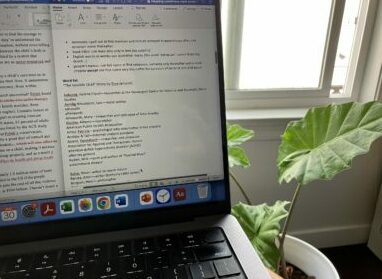Does risk have a role in professional development?

I’ve never really seen myself as a risk-taker. Jump out of a plane wearing a wingsuit? Not for me. Invest in the next hot tech start-up? Not me either. Deliver a talk to an audience of hundreds? No, thanks. And yet I love to travel solo in the backcountry, visit countries where I don’t read or speak the language well, take on work projects in subject areas I know nothing about. Isn’t that risk too?
Over the past nine months, COVID-19 has reshaped many people’s lives. As others have been working tirelessly on the front lines, adapting their businesses to meet changing health guidelines, and juggling homeschooling and full-time jobs, I’ve been fortunate to continue working from home in much the same way as I’m used to. And the work has continued to flow steadily. For all of those things, I’m immensely grateful.
What has changed, though, is the nature of my work. Clients are suddenly asking for a hand in shaping their material for online delivery rather than in person or in print. Professional organizations are requesting help training their staff to use digital editing tools. And universities are looking for support in teaching the growing number of students enrolling in online courses. Nearly a third of the people contacting me are inviting me to do multimedia, teaching, and instructional design work I’ve never done before.
Surprisingly, instead of feeling anxious, I’m mostly excited. Just as I’ve never performed a stand-up comedy routine before a live audience, I have also never created an online interactive course for hundreds of students across the country. Either could lead to extraordinary success or to incredible failure. But why does one option feel so much riskier to me than the other? It turns out that science has a lot to say on this subject.
Elke Weber, a psychologist at Princeton University, developed a model called “domain-specific risk propensity.” That’s really just a fancy way to say that everyone has a different tolerance for risk in five areas: financial, health/safety, recreational, ethical, and social. So my tolerance for risk in the recreational sphere is high relative to other people’s, whereas my tolerance for risk in the financial and health/safety spheres is low.
Most people are willing to take more risk in some areas than others, and the risk depends on how much we expect to benefit from the outcome. For example, I place a high value on reaching the top of a remote mountain, whereas other people couldn’t care less about having that experience. And when we are optimistic about the outcome, we perceive it as not being risky.
Age, upbringing, culture, and previous experience all play a role in determining how we perceive risk. So does impact bias, our brain’s tendency to overestimate how much will go wrong and how it will affect us. If you’ve ever pictured yourself doing something you find scary—standing in front of a room full of people, for example—and failing, your brain has probably leapt to some awful worst-case scenarios. You freeze onstage or say something embarrassing and feel terrible shame and humiliation. The good news is that those worst-case scenarios usually don’t occur, and if they do, we are more resilient than we think.
As humans we are also wired to look for new experiences, a genetic trait called neophilia. This propensity for novelty has allowed our species to survive by migrating to new environments and adapting to changes in our surroundings. As with most behaviours, some people are more neophilic than others. It turns out that five in every seven of us (70 percent) are neophiles, enjoying a moderate amount of novelty. One in seven (15 percent) is a neophiliac, meaning that we enjoy an extreme amount of novelty. And one in seven (15 percent) is a neophobe, and we really don’t enjoy new things at all.
Psychiatrist C. Robert Cloninger says that having new experiences leads to happiness and better health in people with two other traits: persistence and what he calls “self-transcendence.” So if you do something new and keep at it even without an immediate reward, you’re likely to stay focused and optimistic that the reward will come if you keep trying. That’s persistence. And if you do something new and get lost in the joy of the moment or feel a connection with a greater purpose, then you’re likely to stick with it and enjoy the experience. That’s self-transcendence.
Taking risks has a chemical payoff too. When we take a risk and have a good experience, our brain releases dopamine, we feel good, and we want to take another risk. Being a risk-taker is different from being an adrenaline junkie, however. Adrenaline junkies are motivated by adrenaline and take risks to get a buzz from the fear. Risk-takers are motivated by dopamine and by the reward, not the danger.
So what about risk-taking in our work decisions? Most of us take “calculated risks”: we weigh the benefits against the potential pitfalls and act accordingly. And that’s a sensible approach, especially if you’re already feeling tapped out by the pandemic and other situations in your life. Science suggests, though, that most of us could be taking more risks, more often. Experiencing new things means we are proactively growing our skills, learning from our mistakes, making more informed decisions, and building confidence.
Taking risks does require mental and emotional energy, and it’s fine to start slowly. The key is to pick a challenge you’re excited about. Taking a risk, big or small, and learning something new—even learning you never want to take that same risk again—is, literally, rewarding. And that’s good for our health and good for our business.
And who knows? Maybe skydiving will start to look like fun too.
This Post Has 8 Comments
Comments are closed.




I liked the gently encouraging tone of this article, Lucy. It has such a good mixture of the general–with scientific explanations–and the personal, with your examples from you own life and personality.
Thanks, Nancy! I’m glad you found this article encouraging. Taking risks can be scary, but it can also be really rewarding. And I do think it gets easier with practice.
What a fascinating topic, Lucy. Lots to chew on here. Thanks for sharing all these ideas in one great article.
I’m happy you found this topic interesting, Georgina. All of us take risks to varying degrees, and I love learning how others transform their thinking to turn roadblocks into opportunities.
Thank you, Lucy. This was so interesting (and I’m a geek for stats). Not sure I’ll ever be up for skydiving—but you never know!
You never know is right, Tanya! Taking risks has sometimes led me in interesting new directions (though no skydiving yet).
Well-covered and well-written.
Thanks, Neall!